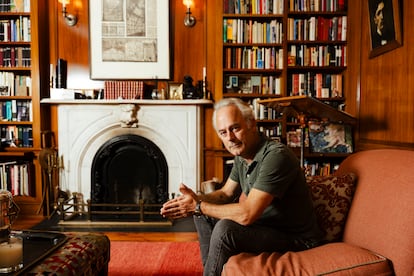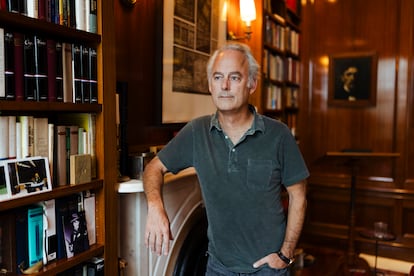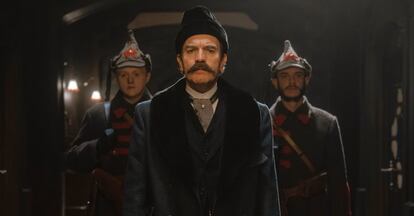Amor Towles, writer: ‘More books have been sold in the US in recent years than ever before, fiction is holding its own’
The novelist, author of the best-selling ‘A Gentleman in Moscow,’ recently published a book of short stories titled ‘Table for Two’


Amor Towles, 59, is surprised when he’s asked what he would say to critics who, from time to time, announce the death of the novel. It doesn’t seem like the most relevant question for a best-selling writer like him, with millions of books sold around the world and a legion of readers, who fell in love with A Gentleman in Moscow (2016). It was his second novel: it catapulted him to fame and is now experiencing a resurgence, thanks to its recent adaptation into a Paramount+ series.
“I was only marginally involved in the production. I didn’t write the script, I didn’t direct… I only had the credit of executive producer,” explains the Boston-born Towles, at his home in Manhattan. “So, it’s someone else’s, it’s not my work. I have no information about how it’s doing, although I think Ewan McGregor (who plays Count Rostov, the protagonist of the novel) has done a great job. That’s all I know. And I also know about the new readers who are now approaching the book thanks to the television series.” He considers this to be the main benefit of the adaptation from page to screen.
After three long novels — A Gentleman in Moscow came between Rules of Civility (2011) and The Lincoln Highway (2021) — Towles published a volume of short stories earlier this year: Table for Two. And what a coincidence that the protagonist of the first story is, like Count Rostov and other characters in his books, also a Russian. He’s named Pushkin, to be more precise. Is this a tribute to classic Russian literature?
“It’s more of a coincidence. I don’t have any Russian family. I don’t speak Russian. I didn’t study Russian history at university. I’ve only been to Russia three times, for 20 days or so. So it’s a coincidence. When I was writing Rules of Civility, I wanted the protagonist’s father to have lived a hard life and to pass on to her the virtues of having few expectations, working hard and being cautious, so it made sense that he was of Russian origin. Nothing more.”
An avid reader, Towles readily admits that War and Peace (1867) is one of his three favourite novels. “Along with Moby Dick (1851) and One Hundred Years of Solitude (1967),” he clarifies. “Books that are somewhat similar, because they’re so huge and ambitious. They contain the world.”
“I fell in love with Russian literature as a teenager,” he recalls, “and I read all the great 19th-century novelists and short story writers. Then, I got interested in the avant-garde of the early 20th century. And then the Soviet era. So, for 30 years, I had been reading a lot about Russian culture. It seemed natural to me that [A Gentleman in Moscow] should be set in Russia.”

Unlike his novels, which are set in historical periods — Count Rostov lives in Soviet-era Moscow, Rules of Civility takes place in late-1930s New York City, while The Lincoln Highway tours 1950s America — most of the stories in Table for Two occur in this millennium. However, there’s something in the collection’s pages that manages to escape time. Perhaps it’s a literary style.
For an author accustomed to the long-range of the novel, writing stories — “a genre that’s not very popular in the U.S.” — was a radically different creative exercise. “In a novel, the writer must be very aware of the direction: if, during the first 50 pages, you don’t know what’s happening, you abandon it. But the most important thing when it comes to constructing meaning for readers is the evolutionary dynamic: how the characters change, the experiences they go through, what they learn… then, there are layers of meaning and metaphors that are built over time, in the course of the narrative,” he explains.
“None of this exists in the short story. You let yourself fall into it; things happen the moment you enter. [And] just when you start to glimpse what the characters’ lives are like, why these things have happened to them, it ends,” he continues, assuring EL PAÍS that the vehicle of the story allows for certain things that wouldn’t work in the novel. “For example, the slightly sarcastic, cynical and arrogant narrator in one of the stories — who’s very entertaining there — would bore you in a novel.” Also, he notes, the short story format is unpredictable, with unexpected endings, which can invite you to rethink what you have read.
Towles worked in the financial sector before devoting himself entirely to writing, although it would be incorrect to say that he swapped one thing for another. He stresses that he began writing as a child and only left the investment bank when success had smiled upon him. “I didn’t put my [livelihood] at risk,” he smiles.
His answers are neither categorical, nor conclusive. From his universal literary tastes to his choice of the so-called “great American novel” — a genre all on its own — the writer embraces numerous options. “The term is more than half-a-century old. And the American novel, let’s say, is actually 175 years old, approximately, because it dates back to 1850, or something like that. The idea of a national novel is less prevalent in other countries, such as Spain or France, where the focus is more on individual works than on a defining novel.”
“I think that, in the U.S., it’s less about a book than about an idea: the conquest of territory and the geographical expansion of the country, optimism, immigration… novels such as The Great Gatsby, The Grapes of Wrath, or Moby Dick… but you need 50 years of distance to gain perspective. My novel The Lincoln Highway is also, in this sense, an American novel,” he explains, referring to a coming-of-age story driven by dreams and ambitions, which defined how the country was forged.
When you hear his frequent mentions of iconic fiction, or see his study, with books stacked to the ceiling, it’s not necessary to wonder if Towles is a serious reader. “Obviously, I’ve read a lot of Latin American literature. Also French literature. So it’s not that Russia has a unique position in my readings, but it’s important.” He cites Jean Genet, Céline, Toni Morrison, magical realism, the Beat Generation and detective novels. Or even Paul Auster, who’s the involuntary character — that is, a fictionalized character — in a delightful story about a young apprentice writer and how rewarding literary glory can be.

The question about the presumed death of the novel hangs in the air, anathema in his studio, a space that’s devoted to literary creation. Refuting it further illustrates the global success of his books: his second novel was on The New York Times best-seller list for two years. “More books have been sold in the United States in recent years than ever before, so fiction is holding its own. Certainly, the cultural landscape has changed everywhere, all the time: every 50 years, it does so significantly. Right now, it’s the rise of social media, of streaming services… and that has created more distractions and ways in which the citizen can access stories, or information, or art, or whatever. So the novel [is part of] an increasingly crowded field, but one cannot suggest that this has led to the death of the novel,” he affirms. On the other hand, Towles offers a worse prognosis about the feature film’s fight for survival. “The movie theaters are relatively empty,” he shrugs.
Towles tends to see the glass as being half-full. This includes his take on the political situation in his country. He’s relieved to see that the polls are swinging towards Kamala Harris, the Democratic Party’s presidential candidate. “Polarization only exists when you look at America from one angle. On the big issues, most Americans agree: two-thirds support a woman’s right to choose, stricter levels of gun control, doing something about global warming, or the U.S. getting involved in international affairs in a productive way. But you wouldn’t know all this from what the Republicans say. [They’re] interested in stirring up the debate to create friction, even if there’s agreement on these main issues,” he opines. He dismisses the tension on Twitter and Fox News, declaring that “the political debate is much more toxic than the reality of the country.”
“Trump goes around saying things like ‘we have a terrible crime wave.’ And, statistically, this isn’t true. It’s the lowest level in 25 years. Or [he says] that the economy is a mess, but, in fact, it’s doing so well that most European countries would kill to have an economy like ours, with 4% unemployment… so I don’t have much reason to be pessimistic. The only fear is that Trump’s angry discourse, all his misinformation, will move people to vote for him. And that would be a bad result. But even if Trump were to win, I’m positive about the resilience of the U.S.”
Sign up for our weekly newsletter to get more English-language news coverage from EL PAÍS USA Edition
Tu suscripción se está usando en otro dispositivo
¿Quieres añadir otro usuario a tu suscripción?
Si continúas leyendo en este dispositivo, no se podrá leer en el otro.
FlechaTu suscripción se está usando en otro dispositivo y solo puedes acceder a EL PAÍS desde un dispositivo a la vez.
Si quieres compartir tu cuenta, cambia tu suscripción a la modalidad Premium, así podrás añadir otro usuario. Cada uno accederá con su propia cuenta de email, lo que os permitirá personalizar vuestra experiencia en EL PAÍS.
¿Tienes una suscripción de empresa? Accede aquí para contratar más cuentas.
En el caso de no saber quién está usando tu cuenta, te recomendamos cambiar tu contraseña aquí.
Si decides continuar compartiendo tu cuenta, este mensaje se mostrará en tu dispositivo y en el de la otra persona que está usando tu cuenta de forma indefinida, afectando a tu experiencia de lectura. Puedes consultar aquí los términos y condiciones de la suscripción digital.








































